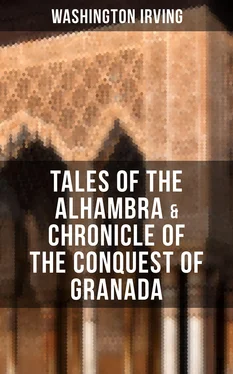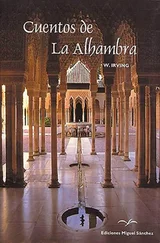The balcony of the window where this royal exclamation was made, has of late become one of my favorite resorts. I have just been seated there, enjoying the close of a long brilliant day. The sun, as he sank behind the purple mountains of Alhama, sent a stream of effulgence up the valley of the Darro, that spread a melancholy pomp over the ruddy towers of the Alhambra; while the Vega, covered with a slight sultry vapor that caught the setting ray, seemed spread out in the distance like a golden sea. Not a breath of air disturbed the stillness of the hour, and though the faint sound of music and merriment now and then rose from the gardens of the Darro, it but rendered more impressive the monumental silence of the pile which overshadowed me. It was one of those hours and scenes in which memory asserts an almost magical power; and, like the evening sun beaming on these mouldering towers, sends back her retrospective rays to light up the glories of the past.
As I sat watching the effect of the declining daylight upon this Moorish pile, I was led into a consideration of the light, elegant, and voluptuous character, prevalent throughout its internal architecture; and to contrast it with the grand but gloomy solemnity of the Gothic edifices reared by the Spanish conquerors. The very architecture thus bespeaks the opposite and irreconcilable natures of the two warlike people who so long battled here for the mastery of the peninsula. By degrees, I fell into a course of musing upon the singular fortunes of the Arabian or Morisco-Spaniards, whose whole existence is as a tale that is told, and certainly forms one of the most anomalous yet splendid episodes in history. Potent and durable as was their dominion, we scarcely know how to call them. They were a nation without a legitimate country or name. A remote wave of the great Arabian inundation, cast upon the shores of Europe, they seem to have all the impetus of the first rush of the torrent. Their career of conquest, from the rock of Gibraltar to the cliffs of the Pyrenees, was as rapid and brilliant as the Moslem victories of Syria and Egypt. Nay, had they not been checked on the plains of Tours, all France, all Europe, might have been overrun with the same facility as the empires of the East, and the crescent at this day have glittered on the fanes of Paris and London.
Repelled within the limits of the Pyrenees, the mixed hordes of Asia and Africa, that formed this great irruption, gave up the Moslem principle of conquest, and sought to establish in Spain a peaceful and permanent dominion. As conquerors, their heroism was only equalled by their moderation; and in both, for a time, they excelled the nations with whom they contended. Severed from their native homes, they loved the land given them as they supposed by Allah, and strove to embellish it with every thing that could administer to the happiness of man. Laying the foundations of their power in a system of wise and equitable laws, diligently cultivating the arts and sciences, and promoting agriculture, manufactures, and commerce; they gradually formed an empire unrivalled for its prosperity by any of the empires of Christendom; and diligently drawing round them the graces and refinements which marked the Arabian empire in the East, at the time of its greatest civilization, they diffused the light of Oriental knowledge, through the Western regions of benighted Europe.
The cities of Arabian Spain became the resort of Christian artisans, to instruct themselves in the useful arts. The universities of Toledo, Cordova, Seville, and Granada, were sought by the pale student from other lands to acquaint himself with the sciences of the Arabs, and the treasured lore of antiquity; the lovers of the gay science, resorted to Cordova and Granada, to imbibe the poetry and music of the East; and the steel-clad warriors of the North hastened thither to accomplish themselves in the graceful exercises and courteous usages of chivalry.
If the Moslem monuments in Spain, if the Mosque of Cordova, the Alcazar of Seville, and the Alhambra of Granada, still bear inscriptions fondly boasting of the power and permanency of their dominion; can the boast be derided as arrogant and vain? Generation after generation, century after century, passed away, and still they maintained possession of the land. A period elapsed longer than that which has passed since England was subjugated by the Norman Conqueror, and the descendants of Musa and Taric might as little anticipate being driven into exile across the same straits, traversed by their triumphant ancestors, as the descendants of Rollo and William, and their veteran peers, may dream of being driven back to the shores of Normandy.
With all this, however, the Moslem empire in Spain was but a brilliant exotic, that took no permanent root in the soil it embellished. Severed from all their neighbors in the West, by impassable barriers of faith and manners, and separated by seas and deserts from their kindred of the East, the Morisco-spaniards were an isolated people. Their whole existence was a prolonged, though gallant and chivalric struggle, for a foothold in a usurped land.
They were the outposts and frontiers of Islamism. The peninsula was the great battle-ground where the Gothic conquerors of the North and the Moslem conquerors of the East, met and strove for mastery; and the fiery courage of the Arab was at length subdued by the obstinate and persevering valor of the Goth.
Never was the annihilation of a people more complete than that of the Morisco-Spaniards. Where are they? Ask the shores of Barbary and its desert places. The exiled remnant of their once powerful empire disappeared among the barbarians of Africa, and ceased to be a nation. They have not even left a distinct name behind them, though for nearly eight centuries they were a distinct people. The home of their adoption, and of their occupation for ages, refuses to acknowledge them, except as invaders and usurpers. A few broken monuments are all that remain to bear witness to their power and dominion, as solitary rocks, left far in the interior, bear testimony to the extent of some vast inundation. Such is the Alhambra. A Moslem pile in the midst of a Christian land; an Oriental palace amidst the Gothic edifices of the West; an elegant memento of a brave, intelligent, and graceful people, who conquered, ruled, flourished, and passed away.
*Urquhart’s Pillars of Hercules.
Table of Contents
Since indulging in the foregoing reverie, my curiosity has been aroused to know something of the princes, who left behind them this monument of Oriental taste and magnificence; and whose names still appear among the inscriptions on its walls. To gratify this curiosity, I have descended from this region of fancy and fable, where every thing is liable to take an imaginary tint, and have carried my researches among the dusty tomes of the old Jesuits’ Library, in the University. This once boasted repository of erudition is now a mere shadow of its former self, having been stripped of its manuscripts and rarest works by the French, when masters of Granada; still it contains among many ponderous tomes of the Jesuit fathers, which the French were careful to leave behind, several curious tracts of Spanish literature; and above all, a number of those antiquated parchment-bound chronicles for which I have a particular veneration.
In this old library, I have passed many delightful hours of quiet, undisturbed, literary foraging; for the keys of the doors and bookcases were kindly intrusted to me, and I was left alone, to rummage at my pleasure — a rare indulgence in these sanctuaries of learning, which too often tantalize the thirsty student with the sight of sealed fountains of knowledge.
In the course of these visits I gleaned a variety of facts concerning historical characters connected with the Alhambra, some of which I here subjoin, trusting they may prove acceptable to the reader.
Читать дальше












